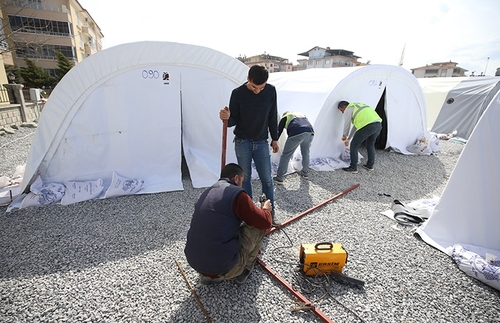In separate statements, the Turkish Medical Association (TTB) and the Progressive Lawyers Association (ÇHD) pointed out the continuing problems in the region affected by the massive double earthquake on February 6.
The Earthquake Crisis Desk formed by the TTB and various healthcare professional organizations released their 19th video bulletin entitled “The Outbreak Risk as Temperatures Are Warming.”
In the video, doctors conveying information from various cities affected by the quakes said deficiencies in the organization of health services were on the increase amid a decrease in public attention to the disaster.
After the floods in mid-March, problems in access to drinking and utility water also increased, they noted.
Failure to meet water and toilet needs and lack of disinfection amid insect density increase the risk of an outbreak, they said.
Sheltering problems in Hatay
The ÇHD report covers the problems in the Antakya, Armutlu, Defne and Samandağ districts of Hatay, a province heavily hit by the quakes.
The report consists of the association’s observations on the field between February 8 and March 6.
Accordingly, there are still problems with electricity distribution and mobile phone and internet services in Armutlu and Samandağ.
“Just as electricity, water had been cut off for days after the earthquake, and as the first month of the earthquake was left behind, the water problem could not be solved throughout the province of Hatay.
“Municipal vehicles sent from other provinces for solidarity carry water to areas with water tanks. However, even the tanks cannot be filled completely because there is not enough water.
“The problem of water to be used in showers and toilets at many help points has still not been resolved.”
“Even though two months have passed since the earthquake, many people still could not solve their housing problem and could not find tents.”
The earthquakes
On February 6, two earthquakes with a magnitude of 7.7 and 7.6 struck the southern city of Maraş.
The quakes affected 10 cities in Turkey’s south and southeast, as well as Syria’s northern parts, where over 5,000 people were killed.
Turkey’s official death toll from the quakes stands at over 50,000 and is expected to increase further, as over 227,000 buildings were destroyed or severely damaged, according to government figures.
Also, about two million people were displaced after the quakes. (AS/VK)
Source:Bianet



